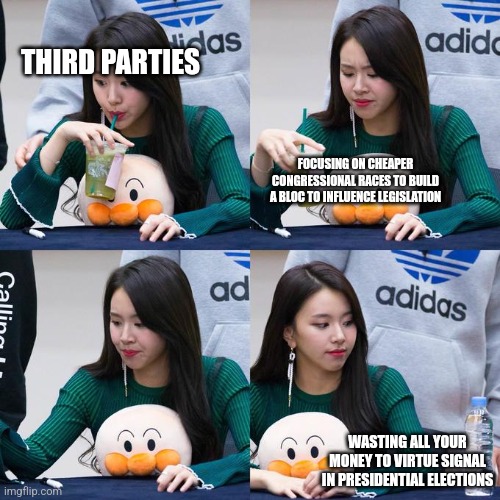this post was submitted on 30 Jun 2024
534 points (91.3% liked)
Political Memes
5445 readers
3164 users here now
Welcome to politcal memes!
These are our rules:
Be civil
Jokes are okay, but don’t intentionally harass or disturb any member of our community. Sexism, racism and bigotry are not allowed. Good faith argumentation only. No posts discouraging people to vote or shaming people for voting.
No misinformation
Don’t post any intentional misinformation. When asked by mods, provide sources for any claims you make.
Posts should be memes
Random pictures do not qualify as memes. Relevance to politics is required.
No bots, spam or self-promotion
Follow instance rules, ask for your bot to be allowed on this community.
founded 1 year ago
MODERATORS
you are viewing a single comment's thread
view the rest of the comments
view the rest of the comments

Let's say one voter gives all candidates 5 stars each, except 1 who gets no stars; and another voter gives no candidate any stars, except 1 who gets 3 stars?
Couldn't tell you the outcome unless you actually gave me the actual votes for each candidate. For personal impact, the first voters has communicated "anyone except this guy" and the second has communicated "I don't like this guy but I hate every other option".
STAR does have the risk of having more than two candidates win with the same rating, but the chances of that happening are astronomically low - even in town elections. You'd have to be using an insanely low number of voters for it to even be plausible.
Let's say 101 voters each give Trump 5 stars.
Let's say 100 voters each give RFK JR 3 stars, Biden 2 stars, and Stein 1 star.
Let's say 100 voters each give Biden 3 stars.
301 voters
200 gave Biden stars
101 gave Trump stars
however,
Trump gets 501 stars
Biden gets 500 stars
RFK Jr gets 300 stars
Stein gets 100 stars
1401 stars, and with 501 Trump wins.
I'm not totally opposed to the idea, but it seems to have some weakness.
EDIT: just realized the math is off. 101 giving 5 stars each is 505 stars. Doesn't change outcome, just the math'll be slightly different.
It feels like you do not fully understand the system yet.
Yes trump and Biden win the most stars, and trump has ~~1~~ 5 more stars.
Then runoff happens. It's now a two-person race between the two individuals with the most stars.
Each person has their vote count towards the candidate they gave more stars to, with equal ratings being treated as abstained votes.
I am taking your writing to mean that if a candidate isn't mentioned for a group, then that group gave zero stars to that candidate. So that is now 200 voters who gave more stars to Biden than trump. Biden 200 - 101 Trump. Biden wins.
The star count only matters for the first stage in narrowing the playing field to two candidates. The actual vote then occurs in runoff. That is not a flaw. The system operated as intended, and the candidate preferred by the largest portion of society won.
505 not 501 stars: thanks for the correction.
Runoffs can be done without stars.
Runoffs would improve either form of counting.
That is a bit of a weird criticism of STAR voting. Scoring Then Automatic Runoff. The runoff is fundamentally a key stage of STAR voting.
I also do not think runoff fixes most voting systems. It isn't compatible with FPTP, approval voting with runoff would cause alot of vote erasure (if you approve of both finalists, your vote is ignored even if you approve one more than the other), and you'd fundamentally have to change how ranked choice works to accept runoff, to the point that you've essentially recreated STAR voting again (but with more or fewer boxes depending on how many candidates there are).